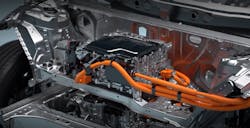Toyota and Idemitsu Partner on All-Solid-State Batteries Project to Power EVs
Toyota announced it is partnering with Idemitsu, a Japanese oil company, to mass produce solid-state batteries, which many consider a key component in future EVs.
The deal represents a major milestone for Toyota as it looks to accelerate its battery EV offerings to stay competitive with other companies, such as Tesla. Toyota says its lag in the EV market is due in part to its success with hybrid vehicles, such as the Prius.
Toyota and Idemitsu are aiming for successful commercialization of all-solid-state batteries by 2028, followed by full-scale mass production shortly after.
“With repeated efforts involving trial and error, we have succeeded in developing a material that is more stable and less prone to crack,” said Toyota Chief Executive Koji Sato. “The future of mobility lies in the tie-up between the auto and energy sectors, including this innovation hailing from Japan.”
Solid-state batteries differ from lithium-ion batteries, and they are believed to be essential for the future of mass commercialization of battery-powered EVs. Lithium-ion batteries are created with liquid components, and although they are widely accepted in the EV industry, they are prone to fires. Solid-state batteries are more stable and potentially more powerful, with the ability to charge an EV in 10 minutes or less.
The collaboration focuses on sulfide solid electrolytes – materials that are soft, adhesive, and suitable for mass production. Idemitsu has developed mass production technology related to sulphide solid electrolytes by studying by-products from petroleum refining.
“The era of the solid-state battery is right around the corner,” said Idemistu Chief Executive Shunichi Kito.
Recently, other large auto manufacturers have also committed to developing solid-state batteries, including Nissan, Ford Motor Co., Mercedes-Benz, and BMW.
Toyota hopes the new batteries will help them fulfill their promise to deliver 1.5 million EVs by 2026.
About the Author
Breanna Sandridge, Senior Editor
Breanna Sandridge is senior editor for EnergyTech and Microgrid Knowledge, both part of the energy group at Endeavor Business Media.
Prior to that, Breanna was managing editor for Machinery Lubrication and Reliable Plant magazines, both part of Noria Corp. She has two years experience covering the industrial sector.
She also is a 2021 graduate of Northeastern State University (Oklahoma) with a Bachelor's in English.
